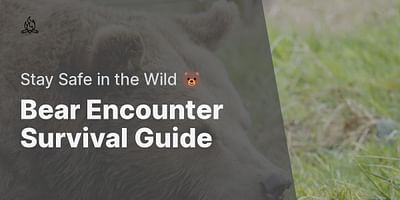Rodrigo is an experienced camper and gourmet enthusiast. He enjoys exploring a variety of flavors and ingredients to concoct unique and appetizing dishes for his camping adventures. Rodrigo's recipes are an ideal choice for those seeking to enjoy mouthwatering food while keeping a balanced diet.
Encountering a bear while camping can be a scary and potentially dangerous situation. It's important to know what to do to ensure your safety and the safety of the bear. Here are some steps to take if a bear comes into your campsite:
1. Stay calm and do not run: Running may trigger the bear's instinct to chase. Instead, stand your ground and try to remain calm. Most bears are not interested in humans and will likely leave on their own.
2. Make yourself look bigger: If the bear approaches you, raise your arms and spread your jacket or backpack wide to make yourself appear larger. This may intimidate the bear and discourage it from coming closer.
3. Back away slowly: If the bear continues to approach, slowly back away while keeping an eye on the bear. Avoid turning your back on the bear, as this may provoke an attack.
4. Speak calmly and firmly: Talk to the bear in a calm and assertive voice. Let it know that you are a human and not a threat. Use phrases like "Hey bear, I'm just passing through" or "Bear, I'm leaving now, please go away."
5. Do not make direct eye contact: Direct eye contact can be seen as a threat by the bear. Instead, look at the bear briefly and then avert your gaze.
6. Do not scream or make sudden movements: Sudden movements or loud noises may startle the bear and cause it to become aggressive. Stay quiet and avoid any sudden actions.
7. Use bear deterrents: If the bear continues to approach and shows signs of aggression, use bear deterrents such as bear spray or noise-making devices. These can help deter the bear and give you time to retreat to safety.
8. Report the encounter: After the bear has left, report the encounter to the appropriate authorities, such as the park rangers or local wildlife management agency. They can provide valuable information and take necessary steps to prevent future bear encounters.
Remember, it's important to always follow bear-safe practices while camping in bear country. This includes properly storing your food in bear-proof containers or hanging it from a tree away from your campsite. Keeping a clean campsite and disposing of trash properly can also help prevent bear encounters.
By staying calm, following these steps, and practicing bear-safe camping techniques, you can minimize the risk of bear encounters and ensure a safe and enjoyable camping experience.















